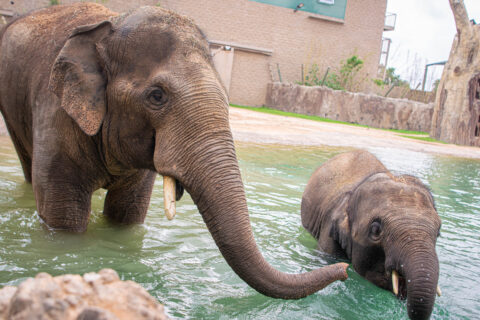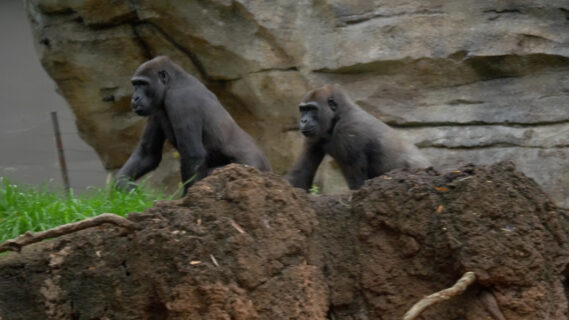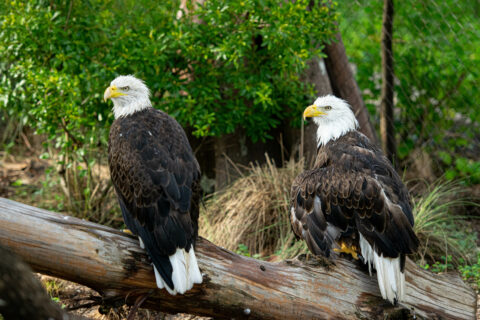Extraordinary Animal Bonds
Houston Zoo Celebrates International Day of Friendship
This International Day of Friendship, Houston Zoo is highlighting some of its inspiring animal friendships. From the African forest to the McNair Asian elephant bull yard, these remarkable relationships show that friendships know no boundaries or circumstances. Animals remind us that companionship is essential to thriving and sometimes a sense of humor is all it takes to create a lasting bond.
 In the McNair Asian elephant bull yard, five-year-old Nelson has gained a best friend in 17-year-old Chuck, who came from Denver Zoo last year. On hot Houston days, the best buds can be seen going for a swim together. One can even say Nelson looks up to Chuck and mimics a quirky behavior. Guests can see Nelson twisting hay and stashing it behind his right tusk, a habit Chuck was known to do before joining Houston Zoo’s herd.
In the McNair Asian elephant bull yard, five-year-old Nelson has gained a best friend in 17-year-old Chuck, who came from Denver Zoo last year. On hot Houston days, the best buds can be seen going for a swim together. One can even say Nelson looks up to Chuck and mimics a quirky behavior. Guests can see Nelson twisting hay and stashing it behind his right tusk, a habit Chuck was known to do before joining Houston Zoo’s herd.
Another playful pair can be spotted in the Africa Forest splashing around and playing together in the water. Known for their playful antics, western lowland gorillas TJ and Leom share a powerful bond and highlight the complexity of friendship in the animal kingdom. As youngsters their interaction was lighthearted and as they’ve matured it has grown into rough play, typical with male gorillas who often use physical strength to establish dominance. But through it all their bromance remains intact.
 In Texas Wetlands, the iconic species and bald eagle duo, Sallie and Mae, can be seen perched on or near their nest. Both share a story of strength and resilience after being rescued from the wild due to wing injuries. Unable to be released back into the wild, they’ve found companionship in each other.
In Texas Wetlands, the iconic species and bald eagle duo, Sallie and Mae, can be seen perched on or near their nest. Both share a story of strength and resilience after being rescued from the wild due to wing injuries. Unable to be released back into the wild, they’ve found companionship in each other.
 In celebration of Member Appreciation Month, Zoo members can share the friendship by bringing a guest free of charge from Aug. 1-7. Guests who visit the Houston Zoo to see these remarkable animal friendships are helping to save their wild counterparts. A portion of each Zoo membership and admission supports the Zoo’s conservation partners in Africa, Asia and here in North America.
In celebration of Member Appreciation Month, Zoo members can share the friendship by bringing a guest free of charge from Aug. 1-7. Guests who visit the Houston Zoo to see these remarkable animal friendships are helping to save their wild counterparts. A portion of each Zoo membership and admission supports the Zoo’s conservation partners in Africa, Asia and here in North America.
